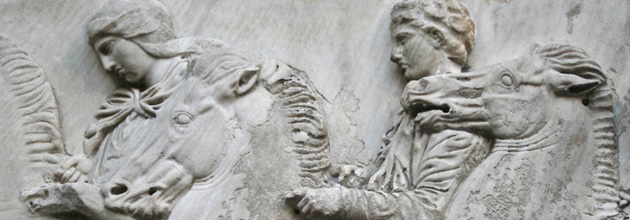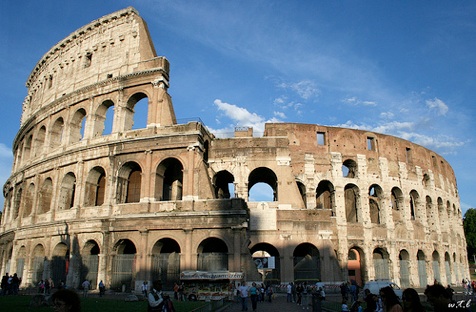
What are the classics?
The word classics (and classicists tend to begin with words) most commonly refers to the study of ancient Greece and Rome, or to the cultures of the ancient Greeks and Romans, and particularly to Greek and Roman literature.
Classics and related English words like classical and class derive from the Latin classis, which could mean, among other things, a class of Roman citizens, based on wealth. The Latin adjective classicus referred, again among other things, to someone who belonged to the highest property class. Just so our word classy doesn't just mean "belonging to some class or another, high, low, whatever," but "first class." And the fancier classical implies a positive value judgment. It is routinely used, in many fields (take classic rock, or classical music) to refer to works that have been around, and been highly valued, for quite some time, works that tend to be regarded as examples to be followed, or at least to serve as sources of inspiration.
Once upon a time, it was widely believed in the western world that most things produced by the ancient Greeks and Romans were better than the products of any other time period. This was particularly true of items of high culture--books, art, architecture, philosophy, etc. So the ancient Greeks and Romans won the right to the term classical--not that it did them much good, as they were well and truly dead by then.

The Flavian Amphitheater, better known as the Colosseum, completed in A.D. 80.
Today very few, even those who have chosen to be classicists (dedicated students of ancient Greece and Rome), will claim that the only things worth reading or looking at were produced by ancient Romans or Greeks, but the term has stuck. Classicalcan, of course, be used in other senses, and is even used, somewhat confusingly, of a period within ancient Greek history, usually defined as 479-323 BC. But the classics(or the Classics--people can't quite decide whether to capitalize the word or not) without qualification are the works of the ancient Greeks and Romans.
What classicists study and teach
Most classicists are either philologists (who primarily study the texts left to us by the ancient world: a philologist is, literally, one who loves language) or classical archaeologists (who primarily study material remains; archaeologists, literally, are those who study old things). It has, however, become increasingly common for individual scholars to use both sorts of evidence, as we have come to see how the study of material culture can inform the study of texts, and vice versa.
What we do at SIU is mainly on the philological side, although Dr. Johnson occasionally offers a course on Art & Archaeology. We teach Latin and Greek at elementary and more advanced levels. But we don't only teach grammar: we try to help students learn how to read many different sorts of texts, including poetic, historical, philosophical, oratorical, and dramatic ones. And we offer many courses that require no knowledge of Latin or Greek. Both when reading these texts in the original and in our courses in translation we discuss the sorts of issues you might find in a department of history, art, English, philosophy, sociology, anthropology, or the like.
Classics is a thus a thoroughly interdisciplinary field. Choosing classics as a major is rather different than choosing history or philosophy: rather than limiting the sorts of questions you ask to historical or philosophical ones, you limit the area and time frame to which you direct your questions.
In recent years the times and places studied by classicists have also broadened to include the whole ancient Mediterranean basin, and to stretch from prehistory to late antiquity, well into the Christian era. And it has also become more accepted for classicists to study the changing uses people have made of the classics in subsequent eras, including our own. Studying classics doesn't cut you off from the modern world: it gives you better perspective on our world.
So classics today is a vibrant field which builds on the legacy of classical scholarship and the classical tradition but is also enriched by a great variety of contemporary theoretical approaches. Classicists have contributed to contemporary debates on issues like morality (many contemporary moral thinkers have argued that classical "virtue ethics" is an important corrective to some more modern ideas) and sexuality (classicists have challenged the idea that homosexuality has never been accepted in Western culture). The classics are even enjoying something of a boon in popular culture: consider the recent films Gladiator, Troy, Alexander, 300, and Percy Jackson & The Olympians--not to mention the various 3D mythological extravaganzas.
